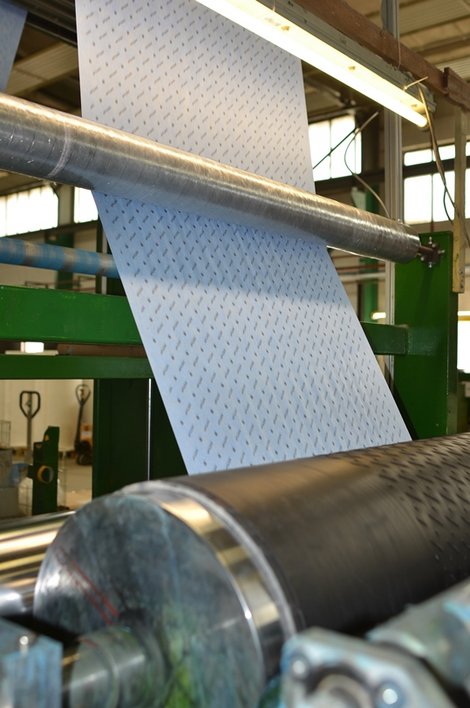Industrial Converting Solution – the company I.C.S. GmbH is making non-woven fabrics smart

Intelligent non-woven fabrics for the food industry, the construction sector, for cosmetics, and as emergency helpers to prevent damage to the environment
Non-woven fabrics are multi-talented. A company from the German federal state of Saxony-Anhalt has dedicated itself to getting all of the hyper-attributes out of these smart materials. It is on the basis of these highly intelligent materials that the company I.C.S. GmbH has developed an oil-absorbent fabric which can absorb 17 times its own weight within the shortest period of time. In the event of petrol, diesel or oil spillages during accidents, roads and waterways can be cleaned rapidly and efficiently. The non-woven fabric works like a magnet. Yet the company from Saxony-Anhalt can achieve far more great things with their non-woven fabrics.
Making them smart – an upgrade for non-woven fabrics
When you ask Claus Fochler what he likes so much about non-woven fabrics, he becomes very enthusiastic. “Non-woven fabrics are incredibly versatile. I have been working with non-woven fabrics for 28 years, and I am still discovering brand-new uses for them. This area never gets boring.” Fochler is the Managing Director of I.C.S. GmbH in Thale, Saxony-Anhalt, which stands for Industrial Converting Solution – which provides an exact description of the strengths of our company. “In our case, converting means that we give added value to the material – more functionality,” explains Fochler. “Our company doesn’t make the non-woven fabrics itself, our work encompasses their refinement and improving their characteristics.”
The “S” in the company’s name stands for Solution. And that is the exact strength of the company: solving problems. “In simple terms, customers approach us who are dissatisfied with the performance of the materials which they have been using so far and are asking the question of whether they could do things better with a non-woven fabric.” And normally, our answer to this question is: “Yes you can!” Even if difficult problems sometimes take a few months of work to solve. “I don’t like the phrase ‘it can’t be done’,” says Fochler with a smile.
Solutions for every sector – from food production to construction
Fochler loves challenges. Together with his team of 30 staff, he thinks about new applications all the time. The 55-year-old launched one of his most recent developments in collaboration with the biggest manufacturer of food seasoning products in the world. He demonstrates a non-woven tube, the inside of which is coated with herbs. “This is where sausage manufacturers or butchers can put their food. The sausage or the ham then matures inside the tube. When the tube is opened at the end of the maturing process, the herbs have settled around the sausage.”
The customers of I.C.S. come from the automotive sector, agriculture, and the furniture and packaging industries. These are joined by facial masks, couch cushions, pads and cleaning cloths which are supplied to the hygiene and cosmetics industry, as well as surgical gowns, mouth guards, instrument covers and wound dressings for the medical sector. “I don’t know of any industry where non-woven fabrics aren’t used,” says Claus Fochler. “That’s the exciting thing about our work. To be able to create application-specific solutions for the customers, we have to understand exactly what is happening in the respective industrial sector and how the non-woven fabrics are going to be used.”
The multi-talented non-woven fabrics
The fabric itself is as versatile as its possible uses. Non-woven fabrics can, for example, be configured so that they are conductive, water-repellent, anti-static, breathable or absorbent. A variety of natural and chemical fibres are used in their production. “The wide range of possible production processes means that it is possible to manufacture the right fabric for each specific application on a targeted basis,” explains Claus Fochler. “Our unique selling point is our know-how in the area of development.”
Once the perfect non-woven fabric has been found for a customer’s application, I.C.S. places the order for its manufacturing at one of its domestic or foreign business partners. It is in Thale that the non-woven fabrics are subsequently glued, thermally formed, printed on, sewn, cut or stamped.
Helping to prevent damage to the environment
In the last ten years, several products have come to fruition at the plant of which Claus Fochler is very proud. One such product is the oil-absorbing fabric. This non-woven fabric enables the rapid absorption of spillages of oil, paint and varnish which can occur during road accidents, shipping accidents and also industrial accidents. “This durable, water-repellent non-woven fabric has exceptionally intelligent characteristics. It is able to absorb 17 times its own weight in liquid, which means that even a small amount of it can absorb a considerable amount of oil. This enables the oil to be almost completely cleared from the affected surface within the shortest of time.”
In this light, in view of preventing unnecessary damage to the environment, Claus Fochler believes it would be a good idea if HGV drivers were legally obliged to carry a roll of this non-woven material with them in their vehicle. “They could then take immediate action and wouldn’t have to wait for the fire brigade to arrive.” The oil-absorbing fabric is also suitable for household use, however: if basement oil tanks leak during cases of flooding, the oil can be absorbed straight away.
Reusable absorbent pads to fight flooding
Another smart non-woven fabric can also prove its value in the case of flooding: it absorbs large volumes of water very quickly. “When the fire brigade has pumped the water out of the cellar and said goodbye, one to two centimetres of water are usually left behind. It is for situations of this kind that we developed our absorbent pads,” says Fochler. The pads are able to absorb and hold up to 25 litres of water in just 90 seconds. “You can even carry them through your living room without them causing any damage because they don’t drip.” When the pad is taken outside and left in the sun the water evaporates, and each pad can be used up to 30 times. “A highly intelligent, absorbent material.”
In actual fact, the absorbent pad is only a spin-off product: the material was originally developed for a leading automotive supplier, which had previously used a granulate for the rapid and safe absorption of the cooling fluid from the electric battery in the event of an accident (absorption performance 1:22). The lightweight non-woven fabric now enables a weight saving of almost two kilograms. “This is a pretty big achievement, since with an electric car, weight ultimately means range,” explains Claus Fochler with pride.
Achievements of this kind are his motivation. Not to mention the federal state of Saxony-Anhalt as a location. “The federal state offers a positive environment to entrepreneurs,” he explains, before immediately going on to praise his team: “I like working here because I have so many employees who bring their flexibility, creativity and loyalty to the team.” Claus Fochler has made his decision: for non-woven materials and for Saxony-Anhalt – both of which continue to impress him with positive surprises.
Author: Dana Toschner





